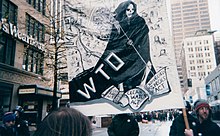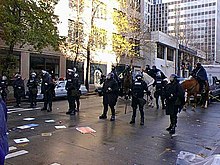1999 Seattle WTO protests
[5] The coalition was loose, with some opponent groups focused on opposition to WTO policies (especially those related to free trade), with others motivated by prolabor, anticapitalist, or environmental agendas.[7] Certain activists, including locals and an additional group of anarchists from Eugene, Oregon[8] (where they had gathered that summer for a music festival),[9] advocated more confrontational tactics, and conducted vandalism of corporate properties in downtown Seattle.[11] On July 16, Helene Cooper of The Wall Street Journal warned of an impending "massive mobilization against globalization" being planned for the end-of-year Seattle WTO conference.[12] Next day, the London Independent newspaper savaged the WTO and appeared to side with the organizers of the rapidly developing storm of protest: The way it has used [its] powers is leading to a growing suspicion that its initials should really stand for World Take Over."The WTO seems to be on a crusade to increase private profit at the expense of all other considerations, including the well-being and quality of life of the mass of the world's people," says Ronnie Hall, trade campaigner at Friends of the Earth International.Overnight, the governor of Washington, Gary Locke, called in two battalions of Army National Guardsmen, other law enforcement agencies sent support, and before daylight on Wednesday, troops and officers lined the perimeter of the no-protest zone.Throughout the day, police used tear gas to disperse crowds downtown, although a permitted demonstration organized by the Steelworkers Union was held along the waterfront.[28] The Seattle City Council dispelled the reports with its own investigation findings: The level of panic among police is evident from radio communication and from their inflated crowd estimates, which exceed the numbers shown on news videotapes.For example, the World Bank/International Monetary Fund (WB/IMF) meetings in the spring showed a "coverage pattern that was almost the reverse of that in Seattle" and that "suggests the crucial role of violence in garnering time on the public screen."That is, not only was this violence contained within the familiar setting of television, and not only did it meet the criteria of being dramatic and emotional enough to warrant air time, but it also shattered preconceived notions of globalization and the practices of corporations that drive so much of America's economy.[33] Previous mass demonstrations had taken place in Australia in December 1997, in which newly formed grass-roots organizations blockaded Melbourne, Perth, Sydney, and Darwin city centers.[34] Controversy over the city's response to the protests resulted in the resignation of the police chief of Seattle, Norm Stamper,[35] and arguably played a role in Schell's loss to Greg Nickels in the 2001 mayoral primary election.[39] On January 30, 2007, a federal jury found that the city had violated protesters' Fourth Amendment constitutional rights by arresting them without probable cause or evidence.





Battle of Seattle (disambiguation)anti-globalization movementpepper spraySeattleNorm StamperIndependent Media CenterDirect Action NetworkSeattle Police DepartmentKing County Sheriff's OfficeWashington State Patrol81st BrigadeWashington Army National GuardAnarchismin the United StatesCincinnati Time StoreMost–Grottkau debateHaymarket affairHomestead strikeAssassination of William McKinleyImmigration Act of 1903Ferrer Center and ColonyImmigration Act of 1918First Red Scare1919 bombingsPalmer RaidsSacco and VanzettiLibertarian Book Club and LeagueCounterculture of the 1960sProtests of 1968Occupy Wall StreetQilomboCapitol Hill Occupied ProtestAbbottAlstonAndrewsAppletonAustinBalagoonBerkmanBookchinBushnellCarsonChomskyCleyreCornellCzologszDolgoffDuffy TurnerEmersonFieldenFischerGoldmanGoodmanGraeberGreeneHahnelHaldeman-JuliusHammondHarmanHeywood (Angela)Heywood (Ezra)HoffmanHolmesIngallsKaczynskiLabadieMagónMaliceMilsteinParsonsPerlmanRothbardSchwab (Justus)Schwab (Michael)SolanasSpoonerThoreauTuckerWaisbrookerWalkerWarrenWilsonZerzanABC No RioAnarcho-Syndicalist ReviewAnti-Racist ActionBeehive Design CollectiveCatholic Worker MovementCommon Ground CollectiveCrimethInc.Curious George BrigadeEarth Liberation FrontIndustrial Workers of the WorldInstitute for Anarchist StudiesInstitute for Social EcologyKate Sharpley LibraryLabadie CollectionMetropolitan Anarchist Coordinating CouncilPortland Anarchist Road CareProfane ExistenceRed Emma'sRuckus SocietyDon't Just Vote, Get ActiveGeorge Jackson BrigadeInstitute for Applied AutonomyInternational Working People's AssociationNew England Non-Resistance SocietyNew York Social Revolutionary ClubSpanish CampTenacious Unicorn RanchUnion of Russian WorkersUp Against the Wall MotherfuckerVanguard GroupWhy? GroupYouth International PartyAK PressAutonomediaThe BlastCatholic WorkerCronaca SovversivaFifth EstateFree SocietyFreiheitGolos TrudaLibertyLoompanicsMother Earth